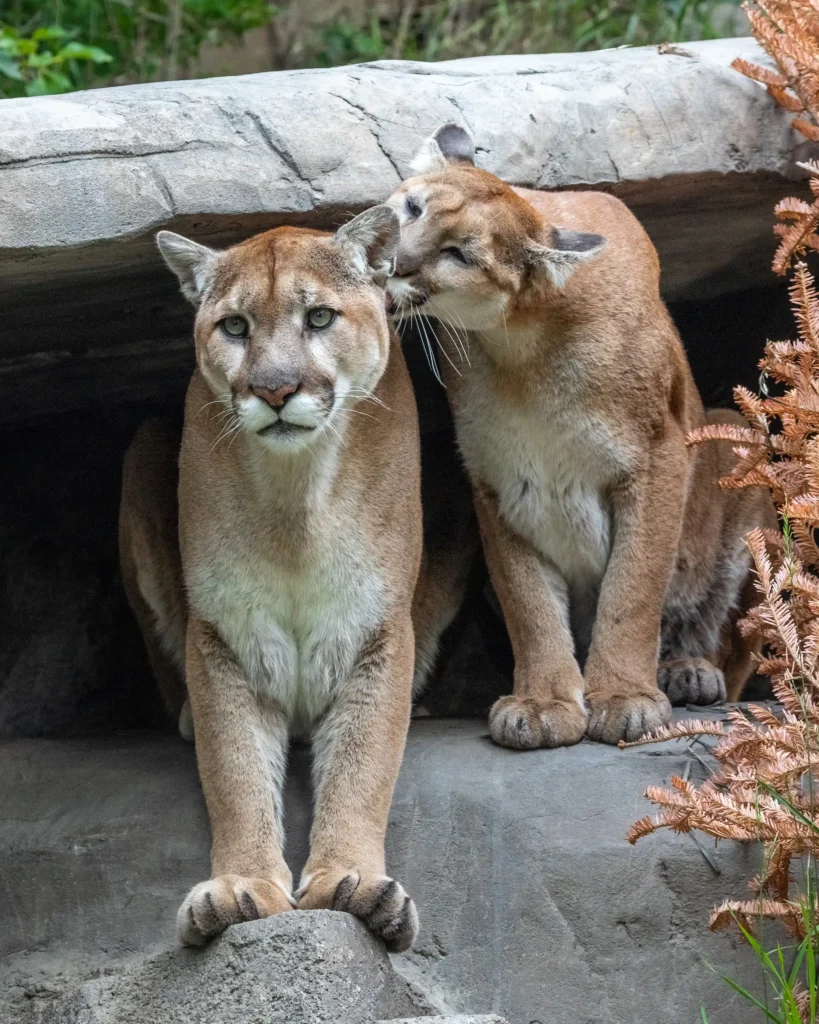Tips for Safe Hiking in Cougar Country
This post may contain affiliate links. This means that we may receive a small commission from purchases through those links. Read more in our affiliate disclosure.
Hiking in cougar country requires extra precautions to ensure safety. Cougars, also known as mountain lions, are large predators that can be found throughout North and South America. While cougar attacks on humans are rare, it’s better to be aware of their behavior and take steps to minimize the risk of an encounter.
You can avoid encountering cougars by making noise to alert them to your presence, hiking during daylight (since cougars are most active at dawn and dusk), and not carrying anything that might smell tasty to them. Cougars typically have little interest in humans, and are most likely to attack when threatened. When approached by a cougar, make yourself big, be loud, and stand your ground or back away slowly – NEVER run away.

In this article, you will learn everything you need to know to stay safe in cougar territories. You might also be interested in our comprehensive hiking safety guide!
- Introduction
- Cougar Behavior
- Safety Gear for Hiking in Cougar Country
- Hiking Safety Practices
- If You Encounter a Cougar
- In Case of a Cougar Attack
- How to Report Sightings and Incidents
- Conservation and Respect
- Frequently Asked Questions
- What should you do if you encounter a mountain lion while hiking?
- How can hikers protect themselves from potential cougar attacks?
- What are the signs that indicate the presence of a mountain lion in the area?
- Are mountain lions likely to attack hikers, and under what circumstances?
- What strategies can deter a mountain lion from approaching you?
- How should you respond if a mountain lion appears to be stalking you?
Cougar Behavior
Territory and Habitat
Cougars, also known as mountain lions, are solitary animals that inhabit a variety of landscapes, including forests, deserts, and mountains. They can be found throughout North and South America, from Canada to Argentina. Cougars are territorial animals and will defend their territory against other cougars and predators.
Signs of Cougar Presence
Cougars are elusive animals that are rarely seen by humans. However, there are a few signs that hikers can look for to determine if there are cougars in the area. These signs include:
- Tracks: Cougar tracks are usually round and have four toes with no claw marks visible.
- Scat: Cougar scat is similar in size and shape to that of a large dog, but it often contains fur and bone fragments.
- Scratches: Cougars will scratch trees and other objects to mark their territory.
- Kills: Cougars will often kill prey and cache it in a secluded area.
Cougar Encounter Statistics
While cougars are generally shy and avoid humans, there have been a few instances of cougar attacks on hikers. According to the National Park Service, there have been 126 cougar attacks on humans in North America since 1890, with 27 of those resulting in fatalities. In other words, the chances of encountering a cougar on a hike are extremely low, and most encounters end without incident.
Safety Gear for Hiking in Cougar Country
There is some safety gear and equipment that can protect you from cougars. This includes:
- Bear spray: Bear spray can be effective in deterring cougars if used properly. And, it’s better to have it anyway! Make sure to carry it in an easily accessible location and know how to use it before heading out on the trail.
- Noise makers: Making noise while hiking can alert cougars to your presence, giving them a chance to move away from the trail. Bring a whistle, bell, or other noise maker to use while hiking.
- Flashlight: Cougars are most active at dawn and dusk, so it is important to carry a flashlight in case you are hiking during these times.

Hiking Safety Practices
Trail Awareness
When hiking in cougar country, it’s important to be aware of your surroundings. Keep an eye out for signs of recent cougar activity, such as tracks, scat, or scratches on trees. Stay on designated trails and avoid bushwhacking, as this can startle a cougar and trigger an attack. Make noise as you walk to alert cougars of your presence, especially in areas with limited visibility.
How to Avoid Attracting Cougars
To minimize the risk of a cougar encounter, hikers should avoid carrying or wearing items that may attract cougars, such as food or strong-smelling perfumes. Hikers should also avoid hiking during dawn, dusk, or at night when cougars are most active. If you do encounter a cougar, do not run away, as this can trigger a chase response. Instead, stand your ground, make yourself look big, and make loud noises to scare the cougar away.
Hike in Groups
Hiking in groups is a great way to reduce the risk of a cougar encounter. Cougars are less likely to attack groups of people than individuals. Additionally, groups can make more noise, which can help deter cougars from approaching. When hiking in groups, make sure to stay close together and keep children and pets close to you. If you do encounter a cougar, stay together and make yourselves look big and loud to scare it away.
If You Encounter a Cougar
Encountering a cougar while hiking can be a frightening experience, but it’s important to remain calm and take appropriate action. Here are some tips to help you stay safe:
Maintain Eye Contact
If you see a cougar, do not turn your back or run away. Instead, maintain eye contact and stand your ground. Cougars are less likely to attack if they think you are a threat.
Make Yourself Appear Larger
To make yourself appear larger, raise your arms above your head and open your jacket if you are wearing one. This will make you look bigger and more intimidating to the cougar.
Back Away Slowly
If the cougar starts to approach you, back away slowly while still maintaining eye contact. Do not turn your back on the cougar or run away, as this can trigger an attack.
In Case of a Cougar Attack

Defensive Strategies
If a cougar approaches you, remain calm and do not under any circumstances run away. Running can trigger the cougar’s instinct to chase, and it may attack. Stand your ground, make yourself look larger by raising your arms and opening your jacket, and make loud noises to intimidate the cougar. If the cougar continues to approach, the hiker should throw rocks, sticks, or any other objects at the cougar to scare it away.
Bear Spray
Bear spray is a useful tool to have when hiking in cougar territory. It is a type of pepper spray that can be used to deter cougars and other predators from attacking. Hikers should keep the bear spray in an easily accessible location and be prepared to use it if necessary. If a cougar attacks, aim the spray at the cougar’s face and spray continuously until the cougar retreats.
What to do after a Cougar attack
In the event of a cougar attack, seek medical attention immediately. The wounds need to be cleaned and disinfected to prevent infection. Report the attack to the local wildlife authorities, so they can take appropriate action to prevent future attacks. It is also important to note that cougars that have attacked humans are usually euthanized, so hikers should take precautions to avoid encounters with cougars in the first place.
How to Report Sightings and Incidents
Local Authorities and Protocols
If hikers spot a cougar or have an encounter with one while hiking, it is important to report the sighting or incident to local authorities as soon as possible. In many areas, this can be done by contacting the local wildlife agency, park rangers, or law enforcement. These authorities will be able to provide guidance on what to do next and can help prevent future encounters by monitoring the area and alerting other hikers.
Make sure to follow any protocols or guidelines provided by local authorities when reporting cougar sightings or incidents. This may include providing a detailed description of the cougar and its behavior, as well as the location and time of the sighting or incident. Hikers should also be prepared to answer questions about their own behavior during the encounter, as this can help authorities determine the best course of action.
Community Alert Systems
Many communities have alert systems in place to notify residents of cougar sightings or incidents in the area. These systems may include text or email alerts, social media updates, or even sirens or other audible alerts. Hikers should be aware of these systems and sign up for any alerts that are available in the areas where they plan to hike.
In addition to community alert systems, hikers can also stay informed about cougar activity in the area by checking local news sources and wildlife agency websites. These sources may provide updates on recent sightings or incidents, as well as tips for staying safe while hiking in cougar territory.
Conservation and Respect

Cougar Conservation Efforts
Hikers should keep in mind that cougars are a protected species in many areas, and their populations are carefully monitored by conservationists. While it can be tempting to view these animals as a threat, it is important to remember that they play an important role in the ecosystem and that their continued survival is essential for the health of the environment.
Many conservation efforts are in place to help protect cougar populations, including habitat preservation and restoration, research and monitoring programs, and public education campaigns. Hikers can support these efforts by following best practices for wildlife viewing and reporting any sightings or encounters to local authorities.
Respect Wildlife
When hiking in cougar country, it is important to remember that you are a visitor in the animals’ natural habitat. This means respecting their space and avoiding behaviors that could be interpreted as threatening or aggressive.
Some tips for respecting wildlife include:
- Keeping a safe distance from animals
- Avoiding loud noises or sudden movements
- Staying on designated trails and avoiding off-trail areas
- Carrying out all trash and leaving the area as you found it
By showing respect for wildlife, hikers can help ensure that cougar populations remain healthy and that these animals continue to thrive in their natural habitats.
Frequently Asked Questions
What should you do if you encounter a mountain lion while hiking?
If you come across a mountain lion while hiking, remain calm and avoid running away. Running may trigger the predator’s instinct to chase, and it may also make you appear more like prey. Instead, face the mountain lion and make yourself appear larger by raising your arms and opening your jacket. Speak firmly and loudly, and throw rocks or sticks if necessary to scare the animal away.
How can hikers protect themselves from potential cougar attacks?
Hikers can take several precautions to protect themselves from potential cougar attacks. Travel in groups rather than alone, and make noise to alert any nearby animals of your presence. Keep children close and under supervision, and avoid hiking during dawn, dusk, or at night when cougars are most active. Additionally, carry bear spray or other deterrents, and know how to use them.
What are the signs that indicate the presence of a mountain lion in the area?
Mountain lions are elusive animals, but there are several signs that indicate their presence in the area. Look for tracks, scat, or scratch marks on trees, and listen for any sounds such as growling or hissing. If you come across a fresh kill or carcass, it may be a sign that a mountain lion is nearby.
Are mountain lions likely to attack hikers, and under what circumstances?
While mountain lion attacks on humans are very rare, they can occur under certain circumstances. Cougars may attack if they feel threatened, if they are protecting their young or territory, or if they are hungry and unable to find prey. Hikers who inadvertently surprise a mountain lion or get too close to its cubs may be at higher risk of attack.
What strategies can deter a mountain lion from approaching you?
There are several strategies that can deter a mountain lion from approaching you. Make yourself appear larger by raising your arms and opening your jacket, and make loud noises to scare the animal away. Carry bear spray or other deterrents, and know how to use them. Avoid crouching or bending over, and never turn your back on a mountain lion.
How should you respond if a mountain lion appears to be stalking you?
If a mountain lion appears to be stalking you, remain calm and avoid running away. Running may trigger the predator’s instinct to chase, and it may also make you appear more like prey. Instead, face the mountain lion and make yourself appear larger by raising your arms and opening your jacket. Speak firmly and loudly, and throw rocks or sticks if necessary to scare the animal away. If the mountain lion attacks, fight back with anything available, such as sticks, rocks, or even your bare hands.




